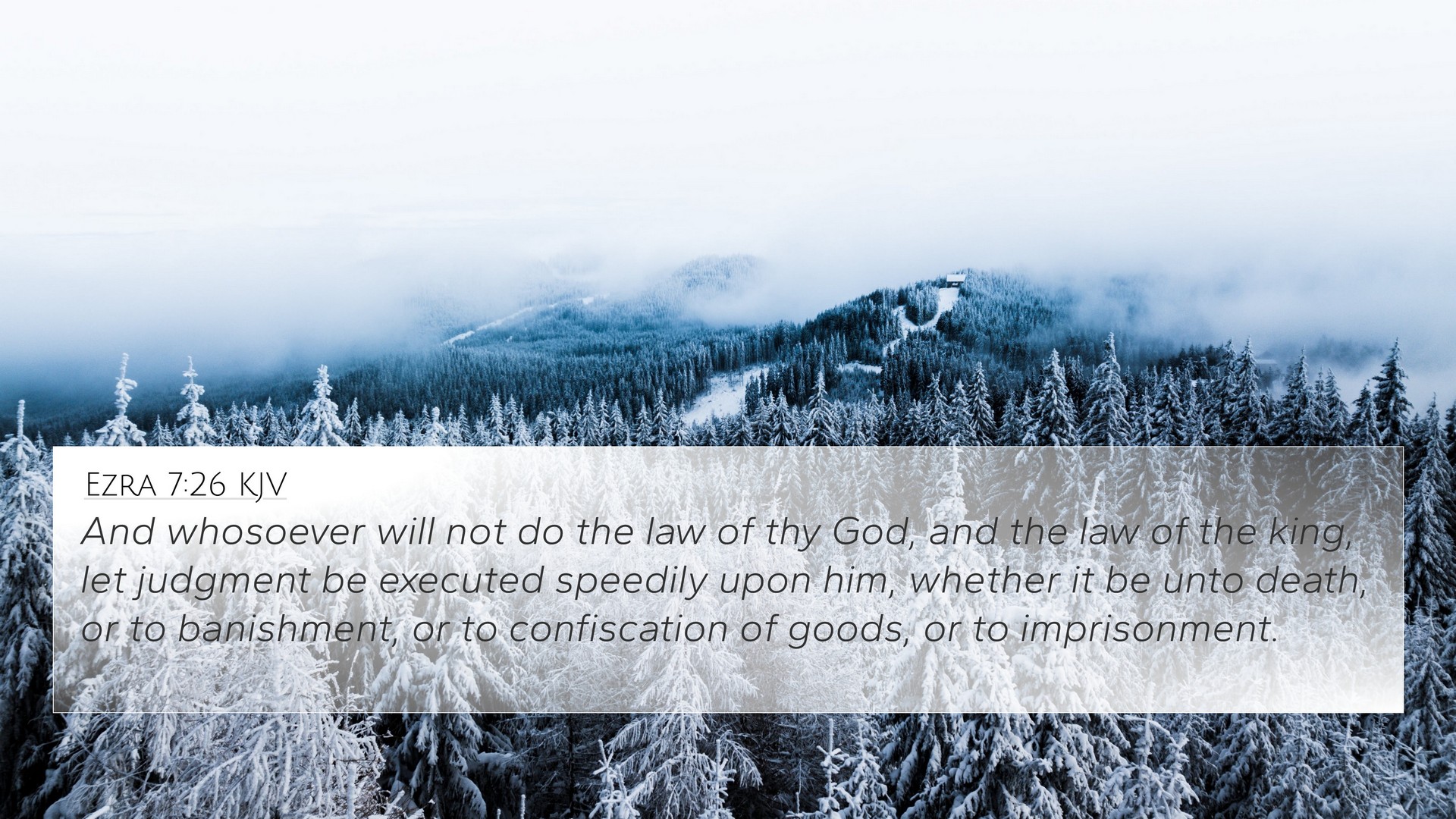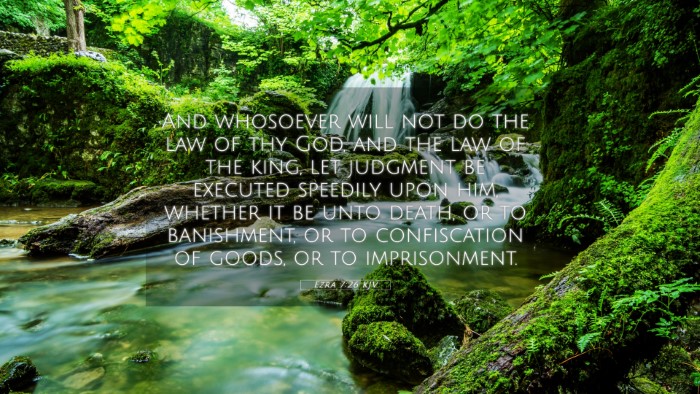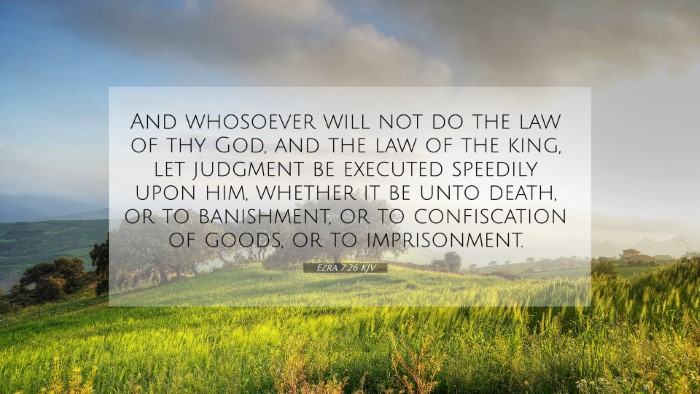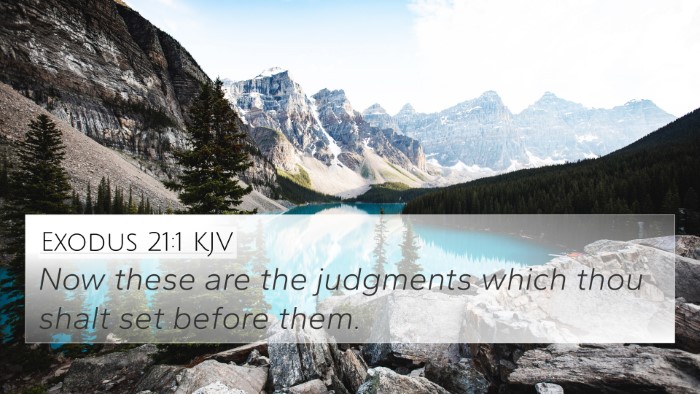Old Testament
Genesis Exodus Leviticus Numbers Deuteronomy Joshua Judges Ruth 1 Samuel 2 Samuel 1 Kings 2 Kings 1 Chronicles 2 Chronicles Ezra Nehemiah Esther Job Psalms Proverbs Ecclesiastes Song of Solomon Isaiah Jeremiah Lamentations Ezekiel Daniel Hosea Joel Amos Obadiah Jonah Micah Nahum Habakkuk Zephaniah Haggai Zechariah MalachiEzra 7:26 Similar Verses
Ezra 7:26 Cross References
And whosoever will not do the law of thy God, and the law of the king, let judgment be executed speedily upon him, whether it be unto death, or to banishment, or to confiscation of goods, or to imprisonment.
Uncover the Rich Themes and Topics of This Bible Verse
Listed below are the Bible themes associated with Ezra 7:26. We invite you to explore each theme to gain deeper insights into the Scriptures.
Ezra 7:26 Cross Reference Verses
This section features a detailed cross-reference designed to enrich your understanding of the Scriptures. Below, you will find carefully selected verses that echo the themes and teachings related to Ezra 7:26 KJV. Click on any image to explore detailed analyses of related Bible verses and uncover deeper theological insights.
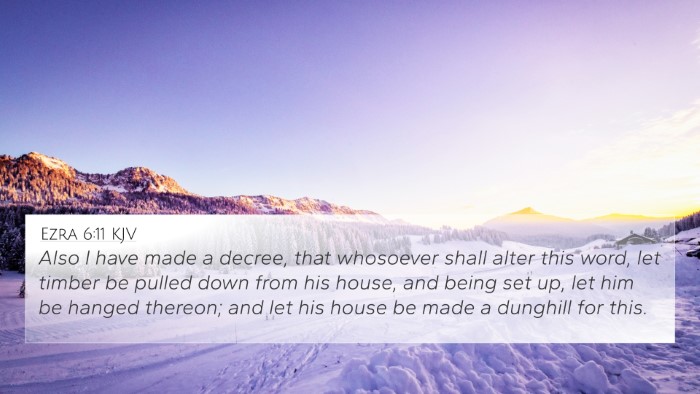
Ezra 6:11 (KJV) »
Also I have made a decree, that whosoever shall alter this word, let timber be pulled down from his house, and being set up, let him be hanged thereon; and let his house be made a dunghill for this.

Deuteronomy 13:1 (KJV) »
If there arise among you a prophet, or a dreamer of dreams, and giveth thee a sign or a wonder,

2 Chronicles 30:12 (KJV) »
Also in Judah the hand of God was to give them one heart to do the commandment of the king and of the princes, by the word of the LORD.
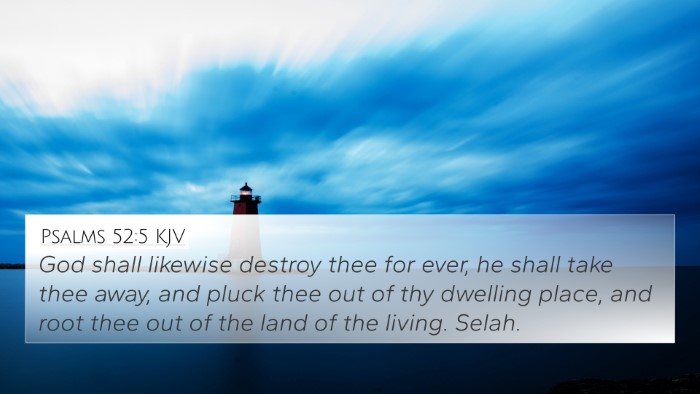
Psalms 52:5 (KJV) »
God shall likewise destroy thee for ever, he shall take thee away, and pluck thee out of thy dwelling place, and root thee out of the land of the living. Selah.

Daniel 6:26 (KJV) »
I make a decree, That in every dominion of my kingdom men tremble and fear before the God of Daniel: for he is the living God, and stedfast for ever, and his kingdom that which shall not be destroyed, and his dominion shall be even unto the end.
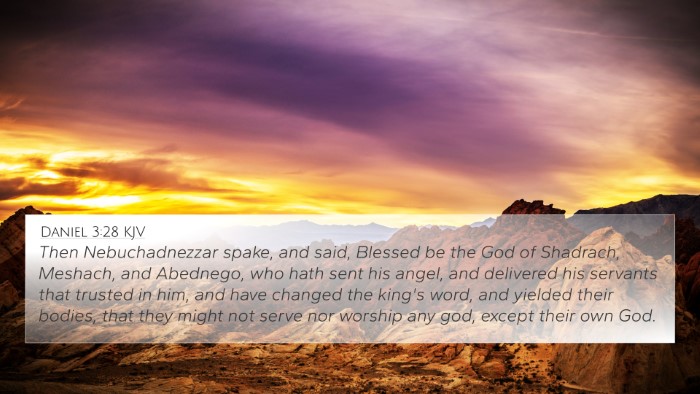
Daniel 3:28 (KJV) »
Then Nebuchadnezzar spake, and said, Blessed be the God of Shadrach, Meshach, and Abednego, who hath sent his angel, and delivered his servants that trusted in him, and have changed the king's word, and yielded their bodies, that they might not serve nor worship any god, except their own God.
Ezra 7:26 Verse Analysis and Similar Verses
Understanding Ezra 7:26
Ezra 7:26 states:
"And whosoever will not do the law of thy God, and the law of the king, let judgment be executed speedily upon him, whether it be unto death, or to banishment, or to confiscation of goods, or to imprisonment."
Summary of Meaning
This verse serves as a powerful reminder of the importance of obedience to both divine and earthly authorities. It establishes a clear directive for maintaining order through adherence to the law of God and the civil regulations instituted by the king. Any refusal to follow these laws comes with severe consequences, an indication of the seriousness of the divine mandate Ezra delivers.
Commentary Insights
-
Matthew Henry:
Henry emphasizes that Ezra, as a leader, was tasked with not just teaching the Law of God but ensuring its implementation. The verse reflects the need for accountability among the people, highlighting that ignoring God's commandments would result in dire repercussions, underscoring the unity of divine and civil law.
-
Albert Barnes:
Barnes points out that the severity of the penalties listed—for death, banishment, confiscation of goods, or imprisonment—serves to denote the critical nature of obeying the Law. These punishments were not arbitrary; they were rooted in a communal understanding that upholding the law was essential to the health of society.
-
Adam Clarke:
Clarke articulates that the integration of religious law with royal edicts in this injunction exemplifies God's divine authority that transcends earthly rulers. It reinforces the idea that all authority, both sacred and secular, must be respected, as they derive their legitimacy from God.
Bible Cross References
Engaging in a comparative Bible verse analysis can enhance our understanding of Ezra 7:26. Several other verses resonate with its themes, which include obedience to God's law and the consequences of transgression:
- Deuteronomy 17:12: This verse reiterates that any person who presumes to disobey the priest or judge must face punishment.
- Romans 13:1-2: Paul speaks about the necessity of submitting to governing authorities, as they have been appointed by God.
- Isaiah 1:19: This verse encourages obedience, promising that willing hearts shall reap the good of the land.
- 1 Peter 2:13-14: Peter advises submission to every human institution for the Lord’s sake, echoing themes of law and authority.
- Proverbs 13:15: This verse describes how good understanding leads to favor, while the way of the unfaithful is hard.
- Hebrews 10:28-29: The consequences of rejecting God's law are made very clear, aggravating the severity of disobedience.
- Matthew 5:19: Here Jesus states that whoever relaxes the commandments of God will be called least in the kingdom of heaven.
Thematic Connections
When exploring the connections between Bible verses, the decree in Ezra not only reflects a moment in Israel’s return from exile but also ties into broader themes of justice, accountability, and the relationship between the faithful and authority:
1. Obedience
Throughout scripture, there is a recurrent call to obedience to God's commandments, seen in the law given to Moses (Exodus 20) and reiterated by the prophets.
2. Consequences of Rebellion
Warnings against disobedience echo from passages in both the Old Testament prophetic literature and New Testament teachings, such as in the teachings of Jesus about the fate of the unfaithful.
3. The Role of Authority
The relationship between divine sovereignty and human authority surfaces repeatedly, fostering a dialogue on how believers should navigate both realms.
Conclusion
Ezra 7:26 serves as a crucial scriptural reference that aligns with multiple Biblical teachings regarding law, obedience, and accountability. By understanding its implications through commentary insights and exploring its connections with other scripture, believers can glean a deeper appreciation for the importance of living in accordance with both God’s law and civil authority. This verse encourages reflection on the nature of authority and the necessity of adhering to a higher moral compass set forth by God.
